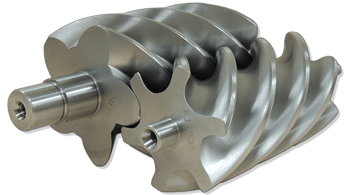5 Reasons A Rotary Screw Air Compressor Might Not Be Right For You
 There are many factors to consider when you are buying a new air compressor. As a rotary screw manufacturer, we typically share the benefits and advantages of rotary screw compressors, and there are many! But that doesn’t mean they’re right for everyone. Let's review five good reasons not to buy a rotary screw air compressor.
There are many factors to consider when you are buying a new air compressor. As a rotary screw manufacturer, we typically share the benefits and advantages of rotary screw compressors, and there are many! But that doesn’t mean they’re right for everyone. Let's review five good reasons not to buy a rotary screw air compressor.
5. You Don’t Need 100% Duty Cycle
If your application only requires intermittent use, you might not need the power of a rotary screw air compressor. Although rotary screw air compressors are designed to handle continuous duty applications where air delivery needs to be consistent, they are more than capable of running in an environment where air use is inconsistent. But that doesn’t mean you need the extra power.
If your application only requires intermittent use, a light duty reciprocating air compressor might be a better option if any of the next four considerations also ring true.
4. You Don’t Have The Budget
Budgets are a concern in every major purchase decision, so we’ll be candid and let you know that rotary screw compressors typically cost more upfront than reciprocating compressors. These initial costs are amortized over the lifetime of the compressor, making them well worth the investment.
Unfortunately, not all budgets will consider that reciprocating compressors deteriorate significantly faster than rotary screws. In this circumstance, the initial investment may be too much for the budget.
If upfront cost is a major factor in your decision process, a rotary screw compressor may not be right for you.
3. You Don’t Want High Air Flow
Rotary screw compressors start to outperform reciprocating compressors above the 30-40 CFM range, but smaller compressors can handle lower air requirements perfectly fine. There may be no need for a more powerful air compressor if all your air tools operate under 30 CFM.
If you need less than 30 CFM, a reciprocating compressor may be your better option.
2. You Won’t Pay For The Maintenance
Rotary screw compressors use synthetic oil for air compression, cooling, and lubrication, and that oil and its filters require regular maintenance. The synthetic oil and regular service work take time and money that some operators aren’t willing to spend.
Reciprocating compressors also require oil and maintenance work, but it costs a little less. That’s because most reciprocating compressors don’t use as many filters and the oil is lower quality, in comparison to rotary screw air compressors.
Maintenance is an important factor for warranty coverage. While reciprocating air compressors often come with a short 1 to 3 year warranty, rotary screw air compressors typically have longer warranties—for example, VMAC backs its compressors with a Lifetime Warranty (Limited). But that warranty only applies if you maintain your air compressor.
If you aren’t willing to properly maintain your air compressor system, a rotary screw air compressor isn’t a good match for you.
1. You Don’t Need To Use It For Long
Rotary screw air compressor can last thousands of hours with the correct maintenance, while low-cost reciprocating compressors don’t tend to last nearly that long without being rebuilt multiple times. But not every worker plans to be in business for the next decade.
If your application calls for an air compressor that doesn’t need to last for thousands of hours, then a reciprocating compressor might be a better choice.
Buying An Air Compressor
Hopefully you now have a better idea of whether a rotary screw air compressor is right for you. We’ve shared some examples of when a rotary screw option might not make sense, but there are more factors to be considered.
We’ve put together several articles that can help you narrow down your options and choose the best air compressor for you:
